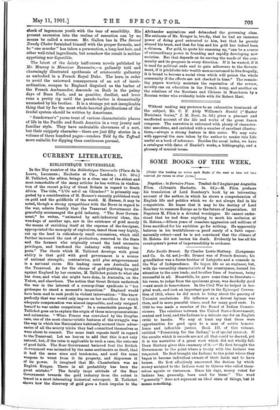Felix Reville Brunot. By Charles Lewis Slattery. (Longmans and Co.
6s. 6d. net.)—Mr. Brunot was of French descent; his grandfather was a foster-brother of Lafayette and a comrade in the War of Independence. He began life as an engineer, but, with the versatility characteristic of his countrymen, turned his attention to the corn trade, and to other lines of business, being successful in all. Meanwhile, be gave some time to literature — his verse, to judge from the specimens given, was decidedly good —and much to benevolence. In the Civil War he helped in hos- pital work, and took an important part in the Episcopal Conven- tion of 1862, where he did much to bring about the passing of Unionist resolutions. His influence as a devout layman was then, and in more peaceful times, used for many good ends. In 1869 he was made a member of the Board of Indian Commis- sioners. The relations between the United States Government, central and local, and the Indians is a delicate one for an English critic to handle. We may at least say that there were opportunities for good open to a man of active benevo- lence and inflexible justice. Book III, of this volume, entitled " Friendship for the Indian," is of special interest. If the results which it records are not all that could he desired, yet it is the narrative of a great work which did not wholly fail. Dean Slattery gives this summary of it :—" He first brought the Government to the point where a treaty with the Indians was respected. He first brought the Indians to the point where they began to become individual owners of their lands and to have homes. He first effectively uncovered the devices by which money assigned to the Indians went to thieves who called them- selves agents or statesmen. Since his days, money voted for Indians has, generally, been used for them." The word "generally" does not represent an ideal state of things, but it means something.






































 Previous page
Previous page